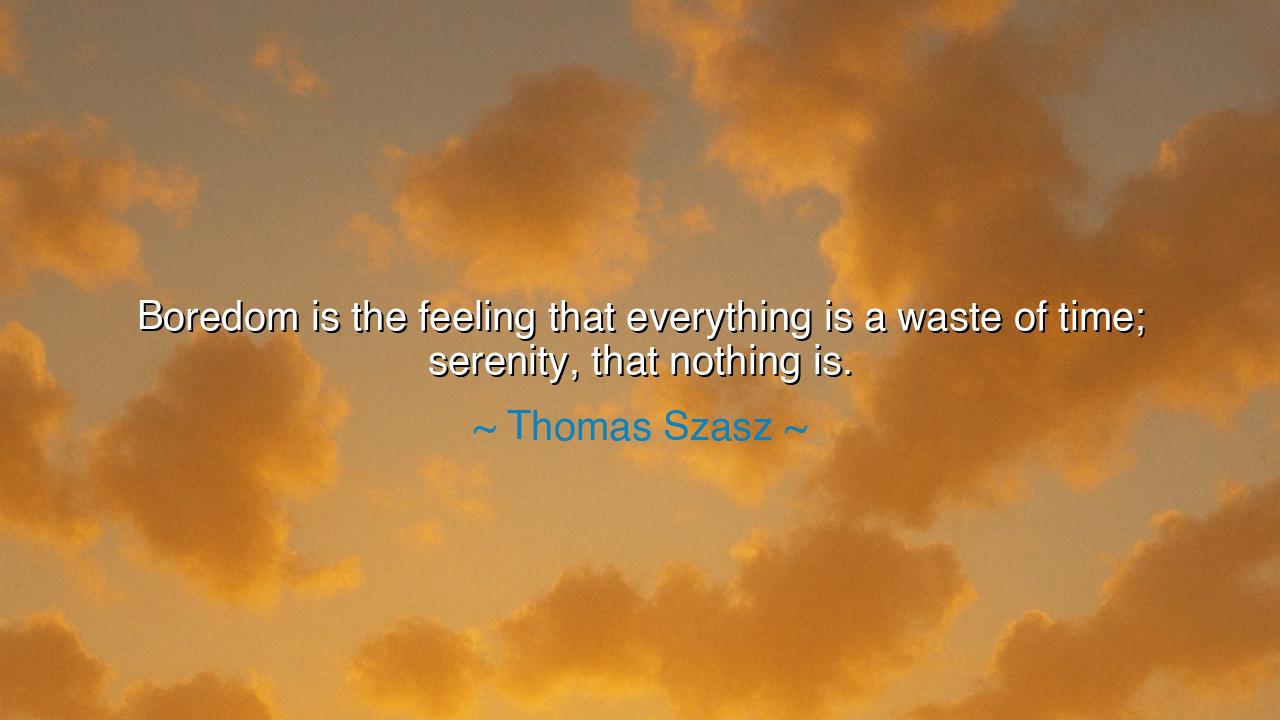
Boredom is the feeling that everything is a waste of time;






The healer of minds, Thomas Szasz, once uttered words that pierce to the very heart of human experience: “Boredom is the feeling that everything is a waste of time; serenity, that nothing is.” In this saying lies a wisdom that reaches across the ages, a reminder that the measure of life is not found in the length of days nor in the abundance of tasks, but in the spirit with which one meets them. For what the restless call empty, the serene call sacred.
To feel boredom is to dwell in discontent, to see the hours as a burden and the minutes as chains. The man who is bored looks upon the rising sun and finds it tedious, hears the song of birds and calls it noise, tastes his bread and calls it bland. His eyes, though open, are veiled, and his soul, though living, sleeps. He believes life is wasting him, when in truth it is he who is wasting life.
But to live in serenity is to awaken to the hidden richness of all things. The serene man sits in silence and calls it peace. He watches the same sun climb the sky and marvels at its light. He sees in every breath a gift, in every small act a thread in the vast tapestry of existence. Nothing is wasted, because every moment holds within it the eternal, waiting to be recognized. Thus, Szasz teaches us that the difference between despair and peace lies not in what happens, but in the heart of the one who beholds it.
History itself bears witness to this truth. Consider Nelson Mandela, imprisoned for twenty-seven years within the walls of Robben Island. To a man consumed by boredom, such years would have been torment, a wasted life in the grip of stone and steel. Yet Mandela, through the strength of serenity, transformed those years into preparation. He studied, he reflected, he grew in wisdom. And when at last the doors of his cell opened, he walked forth not as a broken prisoner but as a leader, ready to heal a divided nation. What for another would have been emptiness became for him fullness, because he learned to see meaning where others would see waste.
The teaching, then, is simple yet profound: it is not circumstance that shapes our spirit, but perception. The same hour may be a chain to one man and a treasure to another. The same silence may be prison to one soul and sanctuary to another. To walk in serenity is to choose to see the eternal value in all things, to recognize that no moment is wasted if it is embraced with awareness and gratitude.
The lesson for us, children of tomorrow, is this: when you feel the weight of boredom, do not flee from it with endless distractions, but turn inward and awaken your vision. Ask yourself what hidden gift lies in the moment. Practice gratitude for even the smallest things—the breath in your lungs, the warmth of your food, the presence of a friend. By this, you transform boredom into serenity, and wasteland into garden.
Practical action lies in discipline: each day, set aside a time to be still, not to escape the world but to embrace it. In stillness, practice the art of noticing. When the mind cries, “This is a waste,” challenge it by seeking meaning. When the heart is restless, anchor it in gratitude. With time, the chains of boredom will fall away, and you will find in their place the crown of serenity, the wisdom that nothing—no moment, no breath, no experience—is ever wasted.
Thus remember Szasz’s words: boredom is blindness to the treasure of life; serenity is the vision that sees treasure everywhere. Choose vision. Choose serenity. And life itself will become, in all its hours, a gift beyond measure.






AAdministratorAdministrator
Welcome, honored guests. Please leave a comment, we will respond soon